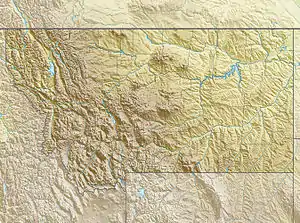Lee Metcalf National Wildlife Refuge
Lee Metcalf National Wildlife Refuge is a 2,800-acre (1,100 ha) National Wildlife Refuge (NWR) along the Bitterroot River in southwestern Montana, U.S.[2][3] Established in 1964 as Ravalli NWR, it was renamed in 1978 in honor of the late Senator Lee Metcalf, a native of Montana. The refuge was set aside for the protection of migratory bird species.[4] About 235 species of birds have been documented on the refuge, with over 100 nesting there. Additionally, 37 species of mammals, and 17 species of reptiles and amphibians also have been documented.[5]

| Lee Metcalf National Wildlife Refuge | |
|---|---|
IUCN category IV (habitat/species management area) | |
 | |
  | |
| Location | Ravalli County, Montana, USA |
| Nearest city | Missoula, MT463339N 1140451W |
| Coordinates | 46°33′39″N 114°04′51″W[1] |
| Area | 2,800 acres (1,100 ha) |
| Established | 1964 |
| Governing body | U.S. Fish and Wildlife Service |
| Website | Lee Metcalf National Wildlife Refuge |
The refuge's wildlife viewing area covers 160 acres (65 ha) of wetlands and riparian woodland. It includes two nature trails and a paved, wheelchair-accessible trail from the parking lot to the picnic area. The viewing area is equipped with a viewing and fishing structure, outdoor restroom facilities, benches, and an information kiosk.
One of the nature trails, the Lee Metcalf Wildlife Viewing Trail, was designated as a National Recreation Trail.[6]
References
- "Lee Metcalf National Wildlife Refuge". Geographic Names Information System. United States Geological Survey. Retrieved February 8, 2014.
- "Annual Report of Lands Under Control of the U.S. Fish and Wildlife Service" (pdf). U.S. Fish and Wildlife Service. September 30, 2010. p. 23. Retrieved February 8, 2014.
- Stevensville, MT (Map). Topoquest (USGS Quads). Retrieved February 1, 2014.
- "Lee Metcalf National Wildlife Refuge". U.S. Fish and Wildlife Service. Retrieved February 8, 2014.
- "Lee Metcalf National Wildlife Refuge Wildlife List" (pdf). U.S. Fish and Wildlife Service. June 2000. Retrieved February 8, 2014.
- "National Recreation Trails". Historic Preservation. U.S. Fish and Wildlife Service. Retrieved February 8, 2014.
External links
 Media related to Lee Metcalf National Wildlife Refuge at Wikimedia Commons
Media related to Lee Metcalf National Wildlife Refuge at Wikimedia Commons- Lee Metcalf National Wildlife Refuge